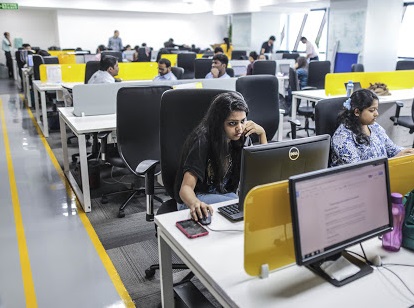Last Updated on May 2, 2025 6:31 pm by INDIAN AWAAZ

R. Suryamurthy
Defying the drag of intensifying global trade tensions, India’s total exports surged to an all-time high of US$824.9 billion in the financial year 2024–25, up 6.01% from US$778.1 billion in the previous year, according to the Reserve Bank of India’s latest report on services trade for March 2025.
The growth comes at a time when global commerce remains under pressure from tariff escalations, supply chain realignments, and economic uncertainty stemming from renewed geopolitical frictions. India’s export performance, especially in services, signals a growing resilience and strategic repositioning in response to these challenges.
Services exports were the standout performer, soaring 13.6% year-on-year to a record US$387.5 billion in FY25, up from US$341.1 billion in FY24. In March alone, services exports rose sharply to US$35.6 billion, reflecting an 18.6% jump from the same month last year.
Merchandise exports, excluding petroleum products, also contributed to the robust figures, climbing 6% to US$374.1 billion — the highest-ever annual total for non-petroleum goods. This growth underscores India’s success in diversifying its export base, with gains in sectors such as electronics, pharmaceuticals, and machinery helping offset global trade volatility.
The RBI data highlights India’s ability to adapt to a rapidly evolving trade landscape by strengthening its foothold in global value chains and expanding into alternative markets. With many traditional trade corridors facing disruptions, India’s IT, financial, and professional services have emerged as key drivers of export growth.
Policy measures aimed at enhancing trade competitiveness — including production-linked incentives, bilateral trade agreements, and digital infrastructure investments — appear to be yielding dividends. The record export figures place India in a stronger position to further expand its trade footprint, even as major economies recalibrate their strategies in the wake of trade conflicts.
As global trade flows continue to fragment, India’s export momentum suggests it is increasingly seen as a stable, high-value partner in a world looking to diversify beyond traditional hubs.
Meanwhile, India and the European Union have reaffirmed their strong commitment to finalize a comprehensive Free Trade Agreement (FTA) by the end of 2025, signaling a deepening of strategic trade ties amidst a complex global economic landscape. The renewed pledge came during a high-level dialogue between India’s Minister of Commerce & Industry, Piyush Goyal, and the European Commissioner for Trade and Economic Security, Maroš Šefčovič.
The meeting, held with a clear focus on navigating current global trade challenges, built upon the strategic roadmap laid out by Prime Minister Narendra Modi and European Commission President Ms. Ursula von der Leyen during the EU College of Commissioners’ visit to New Delhi in February. Both sides underscored the significant strategic value they place on forging a commercially meaningful, mutually beneficial, balanced, and fair trade partnership designed to bolster economic resilience and foster inclusive growth.
Discussions highlighted the progress achieved across various negotiation tracks, with both India and the EU emphasizing the critical need to maintain the current momentum through scheduled monthly negotiating rounds and ongoing virtual engagements. They reiterated their joint intention to address outstanding issues with mutual respect and a pragmatic approach, with the next round of talks slated to take place in New Delhi from May 12-16, 2025.
India emphasized that for the trade negotiations to yield truly meaningful outcomes, equal attention must be paid to addressing non-tariff barriers (NTBs) alongside discussions on tariffs. India stressed that regulatory frameworks must be inclusive and proportionate, ensuring they do not unduly restrict trade flows.
The envisioned India-EU FTA aims to adapt to the evolving dynamics of global commerce by actively supporting the digital transition and fostering diversified and resilient supply chains. Both parties expressed optimism that the agreement, once finalized, will serve as a transformative cornerstone of the broader India-EU strategic partnership. It is expected to significantly enhance market access, promote regulatory cooperation, and stimulate innovation and competitiveness on both sides of the partnership. The crucial role of investment flows and the movement of people in sustaining economic vitality was also acknowledged.
Reflecting India’s growing role as a “Vishwa Mitra”—a partner to the world—and aligning with its developmental objectives for 2047, the India-EU FTA is viewed as a key instrument in promoting diversified production networks and upholding principles of fair trade. This dialogue underscores India’s broader vision of shaping future-ready trade frameworks that align with its national priorities and global aspirations, as it continues to expand its network of free trade agreements.
